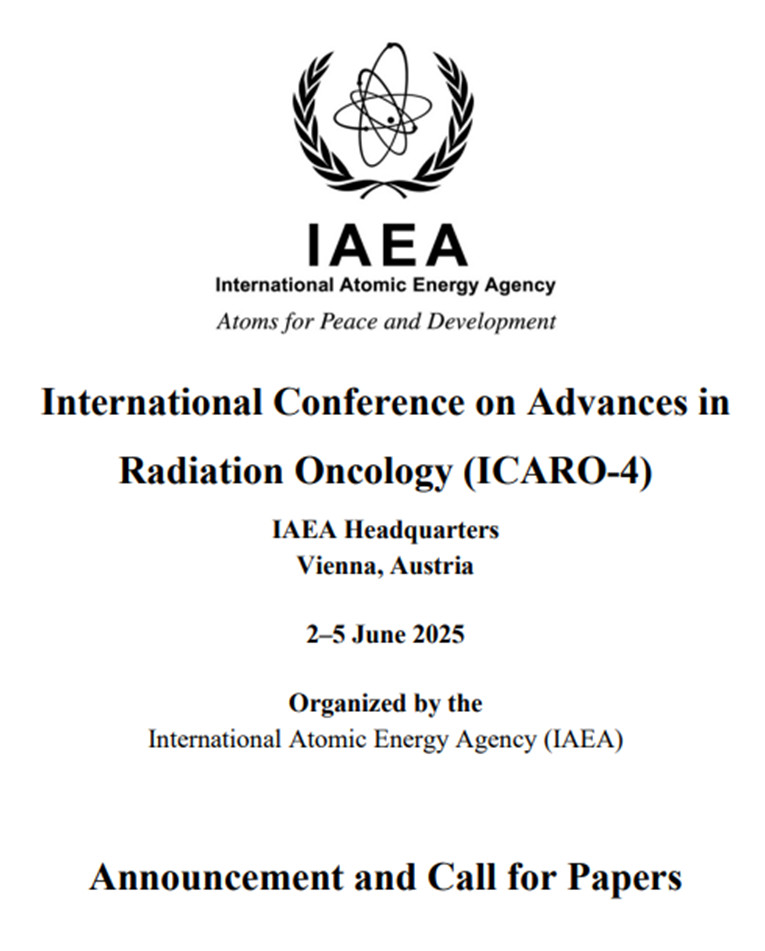
The International Atomic Energy Agency (IAEA) is organizing the fourth International Conference on Advances in Radiation Oncology (ICARO-4), following the successes of ICARO-1, ICARO-2, and ICARO-3 held in 2009, 2017, and 2021, which will be held on 2nd to 5th June 2025 at the IAEA Headquarters, Vienna, Austria. This conference aims to address the striking advances and ongoing challenges in radiotherapy, particularly the access to high-standard cancer care in various countries. The introduction of advanced radiotherapy techniques such as stereotactic radiotherapy, intensity-modulated radiation therapy, image guided and motion management, magnetic resonance imaging-guided linear accelerator LINACs, proton and light ion therapy has significantly improved cancer treatment but also significantly imposed financial burdens on the healthcare systems. ICARO-4 provides a platform for healthcare professionals to review current developments in clinical applications in radiation oncology, radiation biology, and medical physics, focusing on the challenges in cancer management across Member States. Specific objectives include exploring innovations in radiation oncology, applications of improved imaging tools in treatment planning, evidence-based recommendations for common cancers, medical dosimetry, and resource-sparing approaches. Additionally, it will facilitate the exchange of information among leading experts and define future challenges in radiotherapy.
ICARO-4aims to explore the current and future roles of technological, medical physics, and molecular/biological innovations in patient-centered radiation oncology. It will provide a platform for sharing scientific knowledge and best practices related to technological advancements while focusing on patient needs. Topics include technological advances and challenges, setting up modern radiation oncology facilities, new treatment and imaging techniques, and health economics in radiotherapy. Other key areas are treatment planning developments, dosimetry, auditing procedures, personalized medicine, and advances in treating recurrent patients. The conference will also address national cancer control strategies, quality assurance, safety in radiation therapy, and various radiotherapy techniques such as intensity-modulated, image-guided, and stereotactic radiotherapy. Additionally, it will cover proton and light ion therapy, telemedicine, radiation biology, spatially fractionated and FLASH therapy, combined therapies, pediatric radiotherapy, clinical research, applied brachytherapy, and professional education and training.
The conference will begin with an opening session, followed by planned plenary sessions covering critical topics and advancements. Technical sessions will delve into specific areas of expertise, and an innovation and research session will feature flash presentations of cutting-edge research. Policy and professional sessions will include leadership workshops and discussions on strategic plans for enhancing capacity in low- and middle-income countries. Global radiotherapy service implementation will be addressed through collaborations with MD Anderson, St. Jude’s, WHO, and Anchor centres. Clinical technology workshops and discussions will be held, along with a database management workshop focused on SUNRISE. Sessions on audit and quality assurance will ensure high standards in radiotherapy. Standing stations with virtual reality and new e-learning platforms like ROVER will be available. Parallel sessions will allow attendees to choose relevant topics, and side events will highlight initiatives such as WIN IAEA, gender equity, and success stories from the Rays of Hope. It is expected that ICARO-4 will provide an international forum for clinicians, scientists, and professionals to review the latest radiotherapy developments and address common health challenges. Interested participants should visit the Home: International Conference on Advances in Radiation Oncology (ICARO-4) | IAEA. on the IAEA website for further information.
